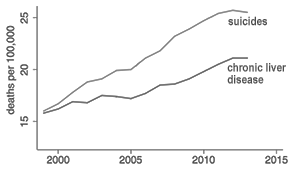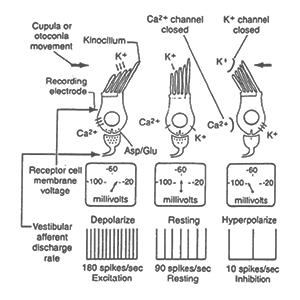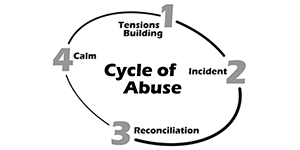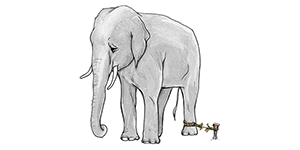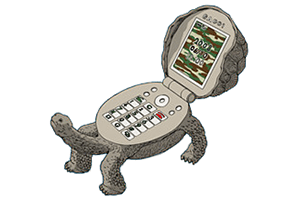Shit life syndrome (SLS) is a phrase used by physicians to describe the effect that a variety of poverty or abuse-induced disorders can have on patients.
Journalist Sarah O’Connor’s 2018 article for the ‘Financial Times’ ‘Left behind: can anyone save the towns the economy forgot?’ on shit life syndrome in the English coastal town of Blackpool won the 2018 Orwell Prize for Exposing Britain’s Social Evils. O’Connor wrote: ‘Blackpool exports healthy skilled people and imports the unskilled, the unemployed, and the unwell. As people overlooked by the modern economy wash up in a place that has also been left behind, the result is a quietly unfolding health crisis.”
read more »
Shit Life Syndrome
Havana Syndrome
Havana syndrome is a set of medical signs and symptoms experienced by U.S. and Canadian embassy staff in Cuba. Beginning in August 2017, reports surfaced that American and Canadian diplomatic personnel in Cuba had suffered a variety of health problems, dating back to late 2016.
A 2018 study published in the journal Neural Computation identified pulsed radiofrequency/microwave radiation (RF/MW) exposure via the Frey effect as source of injury, and noted that a microwave attack against the U.S. embassy in Moscow had been documented. Other possible causes for the injuries offered include ultrasound via intermodulation distortion caused by malfunctioning or improperly placed Cuban surveillance equipment, cricket noises, mass psychogenic illness, and exposure to neurotoxic pesticides.
read more »
Trump Derangement Syndrome
Trump Derangement Syndrome (TDS) is a neologism used by its adherents to describe a reaction to United States President Donald Trump by liberals, progressives, and anti-Trump conservatives, who are said to respond to Trump’s statements and political actions irrationally, with little regard to Trump’s actual position or action taken.
The use of the term by some on the right has been called part of a broader GOP strategy to discredit criticisms of Trump’s actions, as a way of ‘reframing’ the discussion by suggesting his political opponents are incapable of accurately perceiving the world. However, according to Kathleen Hall Jamieson of Annenberg Public Policy Center, the term could backfire on Trump supporters because people might interpret it to mean that Trump is the one who is ‘deranged,’ rather than those who criticize him.
read more »
Phantom Vibration Syndrome
Phantom vibration syndrome or ‘phantom ringing’ is the mistaken feeling that one’s mobile phone is vibrating or ringing. Other terms for this concept include ringxiety (a portmanteau of ‘ring’ and ‘anxiety’) and ‘fauxcellarm’ (a play on ‘false alarm’). It is a form of pareidolia, a psychological phenomenon involving a stimulus (such as an image or a sound) wherein the mind perceives a familiar pattern where none actually exists. Phantom ringing may be experienced while taking a shower, watching television, or using a noisy device. Humans are particularly sensitive to auditory tones between 1,000 and 6,000 hertz, and basic mobile phone ringers often fall within this range.
In the comic strip ‘Dilbert,’ cartoonist Scott Adams referenced such a sensation in 1996 as ‘phantom-pager syndrome.’ The earliest published use of the term dates to a 2003 article in the ‘New Pittsburgh Courier,’ written by Robert D. Jones. In the conclusion of the article, Jones writes, ‘…should we be concerned about what our mind or body may be trying to tell us by the aggravating imaginary emanations from belts, pockets and even purses? Whether PVS is the result of physical nerve damage, a mental health issue, or both, this growing phenomenon seems to indicate that we may have crossed a line in this ‘always on’ society.’
Battered Person Syndrome
Battered person syndrome is a physical and psychological condition of a person who has suffered (usually persistent) emotional, physical, or sexual abuse from another person. The condition is the basis for the battered spouse defense that has been used in cases of spouses who have killed their abusers. The condition was first researched extensively by American psychologist Lenore E. Walker, founder of the Domestic Violence Institute, who used psychologist Martin Seligman’s ‘learned helplessness’ theory to explain why abused spouses stayed in destructive relationships.
The syndrome develops in response to a three-stage cycle found in domestic violence situations. First, tension builds in the relationship. Second, the abusive partner releases tension via misconduct while blaming the victim for having caused the event. Third, the abusive partner makes gestures of contrition, but does not find solutions to avoid another phase of tension building and release so the cycle repeats. The repetition of the cycle despite the abuser’s attempts to ‘make nice’ results in the abused partner feeling at fault for not preventing recurrences. However, since the victim is not at fault and the violence is internally driven by the abuser’s need to control, this self-blame results in feelings of helplessness rather than empowerment.
read more »
The Truman Show Delusion
The Truman Show delusion, informally known as Truman Syndrome, is a type of persecutory/grandiose delusion in which patients believe their lives are staged plays or reality television shows. The term was coined in 2008 by brothers Joel and Ian Gold, a psychiatrist and a neurophilosopher, respectively, after the 1998 film ‘The Truman Show,’ about a man who discovers he is living in a constructed reality televised globally around the clock. Since he was in the womb, all the people in Burbank’s life have been paid actors.
The concept predates this particular film. It was based on a 1989 episode of the ‘Twilight Zone,’ ‘Special Service,’ which begins with the protagonist discovering a camera in his bathroom mirror. This man soon learns that his life is being broadcast 24/7 on TV. Author Philip K. Dick has also written short stories and, most notably, a novel, ‘Time Out of Joint’ (1959), in which the protagonist lives in a created world in which his ‘family’ and ‘friends’ are paid to maintain the delusions.
read more »
Galápagos Syndrome
‘Galápagos syndrome‘ (‘Garapagosu-ka’) is a term of Japanese origin, which refers to an isolated development branch of a globally available product. The term is a reference to similar phenomena Charles Darwin encountered in the Galápagos Islands, with its isolated flora and fauna, which were key observations in the development of Evolutionary Theory. The term was originally coined to refer to Japanese 3G mobile phones, which had developed a large number of specialized features and dominated Japan, but were unsuccessful abroad. The term arose as part of the dialog about Japan’s position as an island nation, and related anxiety about being isolated from the world at large. A derived term is ‘gara-kei’ (‘Galápagos cellphone’), used to refer to Japanese feature phones, which remain popular despite the emergence of smartphones.
The term has since been used for similar phenomena in other markets, such as the outdated usage of magnetic stripe for credit cards in the US, as everywhere else has moved onto using EMV smart cards. ‘It has been claimed that the indigenous American automotive industry has suffered from the Galapagos Syndrome – its products have evolved separately from the rest of the world.’ ‘The Galapagosization of Japan continues. A shocking two-thirds of the country’s white-collar workers said they didn’t want to work abroad…ever.’
Kessler Syndrome
The Kessler syndrome (proposed by the NASA scientist Donald J. Kessler in 1978) is a scenario in which the density of objects in low Earth orbit is high enough that collisions between objects could cause a cascade—each collision generating space debris which increases the likelihood of further collisions.
One implication is that the distribution of debris in orbit could render space exploration, and even the use of satellites, infeasible for many generations. Every satellite, space probe, and manned mission has the potential to create space debris. A cascading Kessler syndrome becomes more likely as satellites in orbit increase in number and old satellites become inoperative.
Celebrity Worship Syndrome
Celebrity worship syndrome is an obsessive-addictive disorder in which a person becomes overly involved with the details of a celebrity’s personal life. Psychologists have indicated that though many people obsess over glamorous film, television, sport and pop stars, the only common factor between them is that they are all figures in the public eye. The term Celebrity Worship Syndrome (CWS) is in fact a misnomer. The supposed condition first appeared in an article ‘Do you worship the celebs?’ by James Chapman in a British tabloid newspaper in 2003.
Chapman was basing his article on the journal paper, Maltby et al. (2003). Chapman refers to CWS, but in fact this is a misunderstanding of a term used in the academic article (CWS which stood for Celebrity Worship Scale). Nonetheless Chapman may be generally correct. A syndrome refers to a set of abnormal or unusual set of symptoms indicating the existence of an undesirable condition or quality. Indeed many attitudes and behaviors covered in this research indicate such states.
read more »
Tall Poppy Syndrome
Tall poppy syndrome (TPS) is a pejorative term primarily used in the UK, Canada, New Zealand, and other Anglosphere nations to describe a social phenomenon in which people of genuine merit are resented, attacked, cut down, or criticized because their talents or achievements elevate them above or distinguish them from their peers.
Australia’s usage of the term has evolved and is not uniformly negative. In Australia, a long history of ‘underdog’ culture and profound respect for humility in contrast to that of Australia’s English feudal heritage results in a different understanding of the concept.
read more »
Barbie Syndrome
Barbie syndrome is a term used to describe the desire to have a physical appearance and lifestyle representative of the Barbie doll.
It is most often associated with pre-teen and adolescent females but is applicable to any age group. A person with Barbie syndrome attempts to emulate the doll’s physical appearance, even though the doll has unattainable body proportions.
Foreign Accent Syndrome
Foreign Accent Syndrome is a rare medically recognised condition which is a speech impediment that usually occurs as a resulting side effect of brain injury, such as a stroke or head trauma. As a result of the speech impediment those suffering from the Foreign Accent Syndrome pronounce their native language with an accent that to the ear of the listeners may be mistaken as foreign or dialectical.
It has many other impacts and effects, including poor memory and concentration span, as well as a feeling of loss of identity, potentially causing those affected to go through a bereavement process. Two cases have been reported of individuals with the condition as a development problem and one associated with severe migraine. Between 1941 and 2009 there have been sixty recorded cases.
read more »
